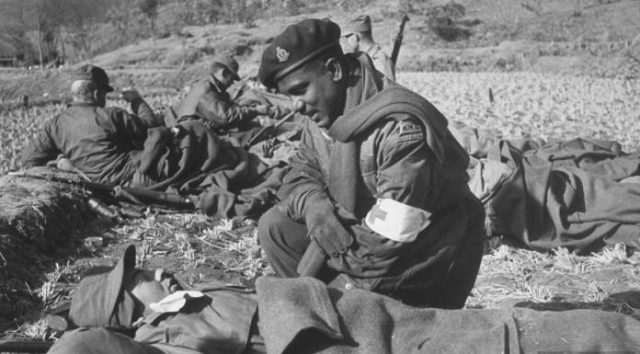
The South Korean government has announced that Lt Colonel AG Rangaraj, the first para-commando of Indian army, will be awarded as the Korean War Hero for the month of July 2020. Korean Ministry of Patriots and Veterans Affairs made the announcement to reward the paratrooper for his role in South Korea-North Korea war that took place in 1950-1953. He had let the 60th Parachute Field Ambulance Platoon, a Mobile Army Surgical Hospital (MASH), during the Korean war.
The first Indian airborne formation was 50th Parachute Brigade which consisted of British, Indian and Gurkha parachute battalions. Lt. Col. AG Rangaraj, MVC, of the Indian Medical Service and RMO of the 152 Indian Para battalion, was the first Indian along with Havildar Major Mathura Singh to make a parachute descent.
The members of the 60th Parachute Field Ambulance were medics who were also parachutists. They jumped into the combat zone along with fighting infantry and provided medical care to injured soldiers in the middle of the war zone.- Ad –– article resumes –
The 60 Parachute Field Ambulance was part of the 50 (1) Para Brigade, and it was sent to Korea to join the United Nations Forces in 1950 as per of the Commonwealth Division. India didn’t send any combating unit to Korea, only the para ambulance unit was sent. The unit commanded by Lt Col. A.G. Rangaraj took part in difficult Air Borne operations in Korea. The Indian media unit has 364 men and it had gained the respect of Commonwealth troops for its high-quality medical care and the courage of the soldiers during the war. The unit had become a medical evacuation unit for the 27th British Commonwealth Brigade in 1950, and supported the Brigade throughout the Korean war. The unit has been awarded official recommendation of the Korean government several times.
During the entire Korean war, the Indian parachute ambulance unit had treated around 200,000 wounded, including around 2,300 field medial operations. They also trained local Korean doctors and nurses.
Some of the achievement of the unit during the war are legendary. Like during the Operation Tomahawk in March 1951, the second largest airborne operation of the war, a dozen medics had para-jumped along with 4000 US troops, and had carried out 103 operations. In November 1950, when the Chinese attacked the UN lines, the parachute ambulance unit had to evacuate, but they had no transport to carry their medical equipment. During that time they stumbled upon an ancient steam locomotive, filled the boilers with water using buckets, and got it running despite having no experience on trains, finally returning to safety before the last bridge on the track was blown.
The unit had won many decorations from the governments of India, South Korea and USA, and the UN. Lt. Col. AG Rangaraj was decorated with Mahavir Chakra in 1951. The unit had won two Mahavir Chakras, six Vir Chakras, one Bar to Vir Chakra and 25 Mention-in-Despatches for its role in the Korean war.
South Korea is currently commemorating the 69th anniversary of the Korean War with its neighbour North Korea. UN forces with nations including India had supported South Korea in the war, while others led by the then Soviet Union and China backed North Korea.
“During the month of July 2020, the photo of Lt. Col A. G. Rangaraj will be put in the War Memorial and other public places in Korea. This gesture is a token of appreciation from the heart of Korean people for the sacrifices made by the participating nations,” said Col. Lee In, the Defense Attaché, Embassy of Republic of Korea in New Delhi, during a luncheon hosted by the Embassy for the family members of the Indian Army veterans who had participated in the Korean War.
“November 20 marks the 69th anniversary of 60 Para Field Ambulance of Indian Army’s arrival to Bussan in Korea in 1950. The event was to pay tribute to the sacrifice of the soldiers who participated in the Korean war. We as a nation will never forget your sacrifices and dedication. Korea also pays gratitude to all 21 nations who participated in the war to protect the freedom and democracy of the Republic of Korea,” added Col. Lee.
Former South Korean president Lee Myung-Bak had said in 2010, “Korea was fortunate to have India, the source of an ancient and noble civilization, as a friend during the war. The medical unit headed by Col A. G. Rangaraj valiantly rushed to the aid of wounded soldiers in the face of a fierce crossfire. For its distinguished service, the unit received citations of merit from the Korean government on a number of occasions. Had it not been for the devoted services and sacrifices of the Indian people, Korea would not have become what it is today.”
Before the Korean operation, Lt. Col. AG Rangaraj had fought against the Japanese in 1944 and was part of a battle in Burma during the World War 2. He was a specialist in Smallpox, and later he became a Senior Advisor to WHO in Afghanistan and the Gulf.
Source: OpIndia














